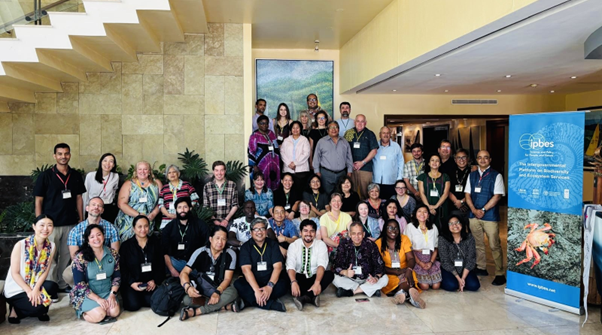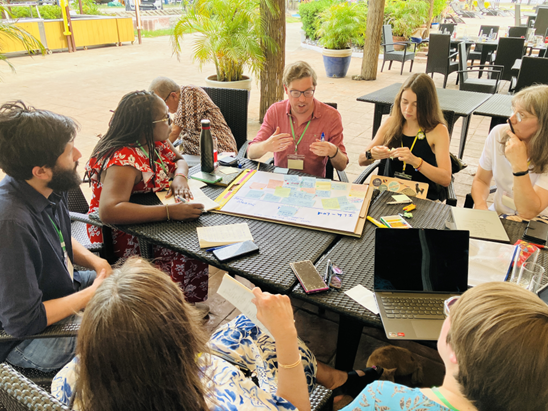Hutton researcher visits Philippines for indigenous knowledge workshop
Hutton researcher Dr Sam Poskitt recently visited Subic Bay in the Philippines for a four-day workshop exploring how local and indigenous knowledge could be incorporated into a worldwide evaluation of biodiversity and ecosystem services.
The workshop was organised by the Intergovernmental Panel on Biodiversity and Ecosystem Services (IPBES) ahead of its second global assessment.
One chapter of the upcoming assessment is set to focus on indigenous and local knowledge about the state of biodiversity, with another looking at future scenarios for biodiversity around the world. In preparation, the IPBES task forces on scenarios and models, and indigenous and local knowledge, co-organised a workshop to explore how indigenous knowledge could be better incorporated into future scenarios for the Global Assessment of Biodiversity and Ecosystem Services.

From a pool of around 100 applicants, Sam was selected to attend the conference alongside 17 other experts, members from the IPBES task forces and representatives from local indigenous groups in the Philippines. While there, he shared his expertise on participatory scenarios approaches for incorporating diverse types of relationships with nature, and represented current Hutton research on participatory approaches for incorporating different types of knowledge to explore diverse values associated with nature.
The first day of the workshop included introductions from each participant and presentations covering the workshop’s context, the local area, and different ways of conceptualising nature and thinking about the future. On the second day, attendees visited a local community of the Aeta indigenous people, where they held a Q&A with community leaders, enjoyed a community lunch and went for a hike to learn more about the challenges facing the Aeta’s traditional way of life.
On days three and four, the workshop focused on small group discussions exploring different examples of scenarios work with indigenous and local knowledge, considering their strengths and challenges. The groups also discussed different approaches for integrating indigenous and local knowledge into the second Global Assessment of Biodiversity and Ecosystem Services, and derived key messages to be conveyed both in the assessment and more widely. A caucus was also held for indigenous participants to reflect on the workshop.
The main takeaways from the discussions included the importance of involving indigenous and local peoples in all stages of scenario-development processes, the need for future assessment scenarios to recognise the interconnectedness of people and nature, and the view that a commitment to uphold the legal, political, intellectual and land rights of indigenous and local peoples, as well as recognition of indigenous and local forms of governance and practice, are essential for including local and indigenous perspectives in assessments of ecosystem and biodiversity services.
Dr Sam Poskitt
“It was great to connect with others who are engaged in working on scenarios approaches for bringing different kinds of knowledge into planning and decision-making around nature.”

The participants now plan to produce a report on the workshop for presentation to the IPBES team and will draft another providing methodological guidance for IPBES scenario development. There is also potential for attendees to become involved in developing methodologies for the upcoming assessment.
Sam plans to use the insights gained at the workshop to inform holistic assessment of values for natural capital in Scotland, as well as work with local communities around land reform and community relationships with land. His attendance at the workshop was made possible by RESAS funding through the project D5-1 – Bringing in participatory approaches to broaden the scope of natural capital valuation.
He said: “It was a real honour and a privilege to be selected to attend this workshop.
“It was great to connect with others who are engaged in working on scenarios approaches for bringing different kinds of knowledge into planning and decision-making around nature. It was interesting to hear different perspectives from indigenous and local peoples, and to learn about scenarios approaches they are working on.
“I was really pleased to see different kinds of knowing and relating to nature receiving the attention they deserve, and glad that participatory and qualitative approaches to scenarios were seen as ways to incorporate diverse knowledges and relationships into assessments of biodiversity and ecosystem services.
“I look forward to bringing these insights into my own research and practice.”
Blog by Matteo Bell, Media Officer, Matteo Bell, at matteo.bell@hutton.ac.uk or on 07494422228.
Disclaimer: The views expressed in this blog post are the views of the author, and not an official position of the institute or funder.
